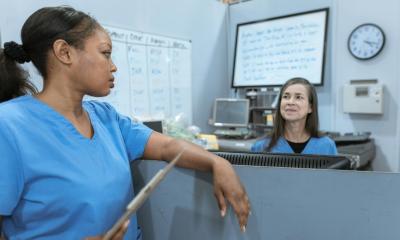
Image source: Adobe Stock/pikselstock
News • Study shows untapped potential
Nurses’ professional judgement not utilised in strategic decision making
Nurses’ voices and professional judgement is not being utilised in strategic decision making, potentially causing dissatisfaction among staff and a lack of high quality patient care, according to new research led by Cardiff Univeristy.
The study, known as Pro-Judge, was funded by the RCN Foundation and looked at how nurses use professional judgement in making decisions about organising the nursing workforce to meet patient needs. Their insights were published in the International Journal of Nursing Studies.
Focusing on three NHS trusts in England and three University Health Boards in Wales the researchers found that while nurses are relied upon to use professional judgment for operational purposes to manage risks during staff shortages, their judgments do not carry the same weight when it comes to agreeing on staffing levels at strategic level. The team suggest this could result in safe but not necessarily high-quality patient care, leading to professional dissatisfaction, which could impact nurse retention and increase staff shortages – which is critical at a time when nurses leaving the profession is the highest in a decade.
It is fundamental that we utilise nurses in the workplace, giving them the tools to empower themselves and appropriate their professional judgement, ensuring that their voices are heard
Deepa Korea
Davina Allen, Cardiff University’s School of Healthcare Sciences who led the study, said: “Healthcare systems lean on nurses' professional judgment for operational staffing decisions, valuing their real-world understanding of clinical environments over data. However, when it comes to strategic decision-making, data takes precedence over professional judgment. Nurses have voiced their concerns that formal measurement systems often fail to capture essential aspects of care quality and staff well-being, making it challenging for them to express their professional judgment for workforce planning. If nurses are to deploy their professional judgement to proactively influence the conditions for care, as well as responding to the challenges of risk mitigation, there is a need for robust systems of nursing measurement aligned with agreed standards of care, a vocabulary through which these judgements can be articulated, and a reframing of strategic decision-making to be more inclusive of the clinical perspective.”
The study suggests three actions to help:
- equipping nurses with a vocabulary to articulate their professional judgment for strategic decision-making;
- being more inclusive of expert nursing clinical and contextual knowledge in healthcare organisations; and
- refining staffing systems to generate data that better captures the complexity of care and nursing workload.
Deepa Korea, RCN Foundation Director said: “We are very proud that our grants for nurse-led research continue to innovate and make a difference to the nursing profession. With nurse retention rates and staff shortages at a critical rate, it is fundamental that we utilise nurses in the workplace, giving them the tools to empower themselves and appropriate their professional judgement, ensuring that their voices are heard.”
Source: Cardiff University
15.11.2023





